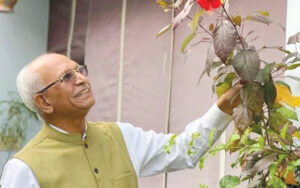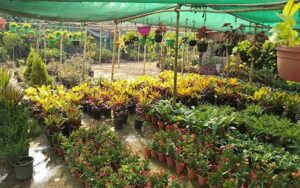Women Empowerment in Floriculture
YP Singh
Editor, Nursery Today
Women have made significant contributions to the fields of floriculture which encompass the cultivation and management of flowers, plants, and gardens. Over the years, women have been involved in various aspects of these industries, from farming and research to business and leadership roles. Here are some notable contributions of women in floriculture and horticulture:
Farming and Cultivation: Women have been actively involved in farming and cultivation in ornamental and flowering plants. They have been responsible for planting, nurturing, and harvesting flowers and plants, and managing agricultural operations. Women farmers have contributed to sustainable and organic practices, innovative cultivation techniques, and crop diversification.
Research and Innovation: Women have been instrumental in conducting research and innovation in floriculture. They have made significant contributions to plant breeding, genetic modification, disease and pest management, and developing new flower varieties and hybrids. Women researchers have helped advance the science and technology of floriculture, leading to improved production practices and better-quality flowers and plants.
Business and Entrepreneurship: Women have been successful entrepreneurs in floriculture. They have established and managed their own flower farms, nurseries, and floral businesses. Women-owned businesses have contributed to the economic growth, providing employment opportunities and driving innovation in marketing, sales, and distribution.
Education and Extension: Women have been involved in education and extension activities in the field. They have served as educators, trainers, and extension agents, sharing their knowledge and expertise with farmers, students, and communities. Women in education and extension have played a vital role in promoting sustainable practices, educating on plant health and nutrition, and empowering communities through gardening and green initiatives.
Leadership and Advocacy: Women have been leaders and advocates. They have held leadership positions in industry organizations, professional associations, and governmental agencies, advocating for policies and regulations that promote sustainability, diversity, and inclusivity in the industry. Women leaders have worked towards gender equality, representation, and empowerment in floriculture and horticulture, driving positive change and progress.
Despite their significant contributions, women in this industry face challenges such as gender bias, unequal access to resources and opportunities, and underrepresentation in leadership roles. However, their resilience, talent, and passion continue to shape and enrich the fields of floriculture and horticulture, making them vital contributors to these industries. Efforts to promote gender equality, diversity, and inclusivity in floriculture and horticulture are essential to ensure that women’s contributions are acknowledged, valued, and amplified.
Challenges and Barriers Faced by Women

Gender bias and discrimination: Women often encounter gender bias and discrimination, both overt and subtle. They may face stereotypes or assumptions that they are less capable or knowledgeable compared to their male counterparts.
Limited access to resources and opportunities: They may have limited access to resources such as land, financing, and technology. This can hinder their ability to start or expand their own businesses or participate in leadership roles within the industry.
Lack of representation and visibility: Women are often underrepresented in leadership positions and decision-making roles within the horticulture sector. This lack of representation can make it challenging for women to have their voices heard and to influence industry policies and practices.
Work-life balance challenges: Balancing work responsibilities with family or caregiving responsibilities can be particularly challenging for women. The sector often involves physically demanding work and long hours, which may create additional barriers for women with caregiving responsibilities.
Limited training and education opportunities: Women may face challenges accessing training and education programs due to financial constraints, lack of awareness, or societal expectations. This can limit their ability to acquire new skills, keep up with industry advancements, and pursue career advancement opportunities.
Occupational health and safety concerns: This industry can involve exposure to chemicals, heavy lifting, and other physical hazards. Women may face specific health and safety concerns, including the need for personal protective equipment designed for female body types and considerations for pregnant workers.
Lack of networking and mentorship opportunities: Women may face difficulties in accessing networking and mentorship opportunities, which are crucial for career growth and professional development. Limited networks can impact their access to information, job opportunities, and support systems.
Addressing these challenges requires concerted efforts from industry stakeholders, policymakers, and organizations. Creating inclusive policies, promoting gender equality, providing mentorship and training programs, and raising awareness about the contributions of women in horticulture can help create a more equitable and supportive environment for women in the industry.
Future of Women in Floriculture
The future of women in floriculture looks promising, with increasing recognition of their contributions and growing opportunities for their involvement. Here are some potential trends and opportunities for women in these fields:

Leadership and Representation: There is a growing recognition of the need for gender diversity in leadership roles within the floriculture industry. Women are increasingly being appointed to leadership positions in industry organizations, research institutions, and businesses. This trend is expected to continue, with more women taking on key roles in decision-making, policy advocacy, and shaping the direction of the industry.
Entrepreneurship and Innovation: Women entrepreneurs are expected to continue making strides. With increased access to resources, funding, and support networks, more women are starting their own businesses, from flower farms to nurseries, and leveraging their creativity, innovation, and unique perspectives to drive change and meet evolving market demands.
Technology and Digitalization: Technology and digitalization are transforming the industries, and women are expected to play a significant role in this domain. From using precision farming techniques to optimizing irrigation and fertilization, to leveraging digital marketing and e-commerce platforms to expand market reach, women in horticulture and floriculture are likely to embrace and contribute to technological advancements.
Sustainable and Organic Practices: There is increasing demand for sustainable and organic products. Women have been at the forefront of advocating and implementing sustainable practices, such as integrated pest management, organic fertilization, and water conservation. As consumers and industry stakeholders prioritize sustainability, women’s expertise in these areas is expected to be highly sought after.
Education and Outreach: Women are expected to continue their roles as educators and outreach specialists. They will likely play a crucial role in educating farmers, consumers, and communities on topics such as plant health, environmental conservation, and the benefits of gardening. Women’s skills in communication, community engagement, and education will be essential in creating awareness and driving positive change.
Global Opportunities: The industries are expanding globally, with increasing demand for flowers, plants, and related products in various regions. This presents opportunities for women to engage in international trade, market expansion, and global collabora tions. Women with expertise in different regions and cultures can leverage their skills and knowledge to access global markets and contribute to the growth of the industry.
Efforts to promote gender equality, diversity, and inclusivity in the floriculture are expected to continue, creating a more inclusive and equitable environment for women. As more women enter and excel in these fields, their contributions are likely to shape the future of the industry, leading to increased innovation, sustainability, and positive impact.

















